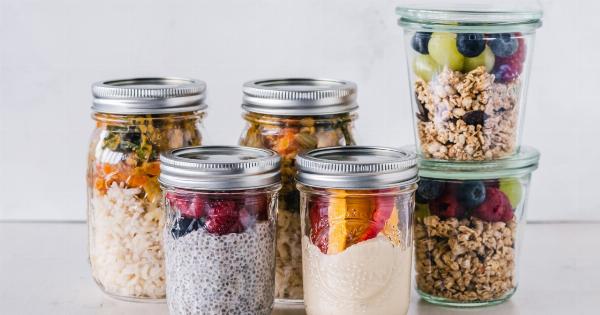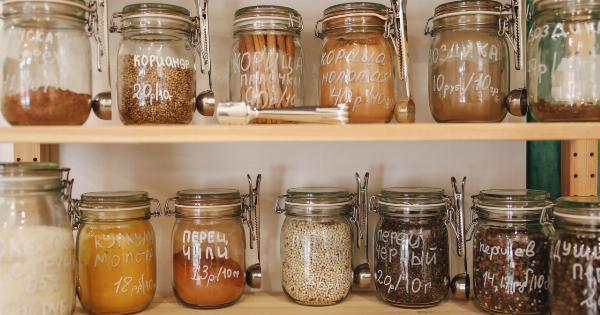When it comes to emergency situations or even just planning for the future, having a well-stocked food storage pantry is essential.
Whether you’re preparing for natural disasters, economic crises, or simply looking to be more self-sufficient, having a variety of shelf-stable foods on hand can provide you with peace of mind and sustenance during uncertain times.
Assessing Your Needs
Before you start building your food storage pantry, it’s important to assess your needs and determine how long you want your supplies to last.
Consider factors such as the size of your household, dietary restrictions, and the potential duration of an emergency situation. This will help you estimate the quantity and types of foods to stock up on.
Building the Basics
Here are some essential items that should be included in your food storage checklist:.
1. Grains and Cereals: Stock up on staples such as rice, pasta, oats, and whole grain cereals. These items provide carbohydrates and are versatile for various meal options.
2. Legumes: Include a variety of dried beans, lentils, chickpeas, and other legumes. They are excellent sources of protein, fiber, and essential nutrients.
3. Canned Goods: Have a selection of canned fruits, vegetables, soups, and meats. Make sure to choose low-sodium options and opt for items packed in water or their own juices instead of heavy syrups or oil.
4. Freeze-Dried Foods: Consider adding freeze-dried fruits, vegetables, and meats to your food storage pantry. They have a longer shelf life and retain much of their nutritional value.
5. Baking Supplies: Don’t forget to include flour, baking powder, baking soda, yeast, and other baking essentials. These items will allow you to make your own bread, biscuits, and other baked goods.
6. Cooking Oils and Fats: Have a variety of cooking oils on hand, such as olive oil, vegetable oil, and coconut oil. Additionally, consider storing shortening or alternative fats for baking purposes.
7. Condiments and Seasonings: Stock up on a range of spices, herbs, sauces, and condiments to enhance the flavor of your meals. These can make a significant difference in the enjoyment of your emergency meals.
Meeting Nutritional Needs
It’s important to ensure that your food storage pantry includes a diversity of nutrients. Here are some additional dietary needs to consider:.
1. Protein Sources: Include a variety of protein sources like canned tuna, chicken, or salmon. Stock up on nuts, nut butters, protein bars, and powdered protein supplements.
2. Dairy and Non-Dairy Options: If you have the means for refrigeration, stock up on long-lasting dairy products like powdered milk or shelf-stable milk alternatives. They can add variety to your meals and provide important nutrients.
3. Vitamins and Minerals: Although food should be your primary source of nutrition, it’s a good idea to have a supply of essential vitamins and minerals. Consider including a multivitamin or specific supplements based on your health needs.
4. Hydration: Don’t forget about water! Water is a vital element of any emergency preparedness plan. Store at least one gallon of water per person per day for drinking and sanitation purposes.
Storage and Rotation
Proper storage is crucial to maintaining the longevity and quality of your food supplies. Follow these guidelines:.
1. Keep it Cool and Dry: Store your food in a cool, dark, and dry place to extend its shelf life. Avoid areas prone to high humidity or temperature fluctuations.
2. First-In, First-Out (FIFO): Practice FIFO rotation to ensure that the oldest items are used first. Place newly purchased or stored items at the back of your pantry, moving older items to the front for easy access.
3. Check Expiration Dates: Regularly check the expiration dates on your food items and replace them as necessary. Aim to keep a well-stocked pantry with a rotation system that ensures freshness.
Additional Tips
Consider these additional tips to enhance your food storage efforts:.
1. Grow Your Own: If you have the space and resources, consider starting a vegetable garden or herb pots. This will provide you with fresh produce during emergencies and supplement your stored items.
2. Stock Up on Comfort Foods: In stressful situations, having a few comfort foods can help boost morale. Include items like chocolate, coffee, or any other treats that can provide a sense of normalcy.
3. Special Dietary Needs: If you or someone in your household has specific dietary restrictions, make sure to stock up on suitable alternatives as part of your food storage plan.
4. Kitchen Supplies: Don’t forget to have non-electric kitchen supplies such as can openers, cooking utensils, and manual grain mills. These will become invaluable if power is unavailable.
Remember, building a comprehensive food storage pantry takes time and effort. Start small and gradually expand your supplies as your budget allows.
By following this ultimate food storage checklist, you’ll be better prepared for any situation that may come your way.































